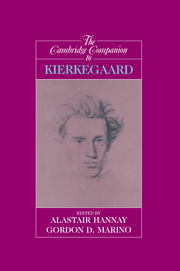Book contents
- Frontmatter
- Introduction
- 1 Out with It!
- 2 The unknown Kierkegaard
- 3 Art in an age of reflection
- 4 Kierkegaard and Hegel
- 5 Neither either nor or
- 6 Realism and antirealism in Kierkegaard's Concluding Unscientific Postscript
- 7 Existence, emotion, and virtue
- 8 Faith and the Kierkegaardian leap
- 9 Arminian edification
- 10 “Developing” Fear and Trembling
- 11 Repetition
- 12 Anxiety in The Concept of Anxiety
- 13 Kierkegaard and the variety of despair
- 14 Kierkegaard's Christian ethics
- 15 Religious dialectics and Christology
- 16 The utilitarian self and the "useless" passion of faith
- Bibliography
- Index
1 - Out with It!
The modern breakthrough, Kierkegaard and Denmark
Published online by Cambridge University Press: 28 May 2006
- Frontmatter
- Introduction
- 1 Out with It!
- 2 The unknown Kierkegaard
- 3 Art in an age of reflection
- 4 Kierkegaard and Hegel
- 5 Neither either nor or
- 6 Realism and antirealism in Kierkegaard's Concluding Unscientific Postscript
- 7 Existence, emotion, and virtue
- 8 Faith and the Kierkegaardian leap
- 9 Arminian edification
- 10 “Developing” Fear and Trembling
- 11 Repetition
- 12 Anxiety in The Concept of Anxiety
- 13 Kierkegaard and the variety of despair
- 14 Kierkegaard's Christian ethics
- 15 Religious dialectics and Christology
- 16 The utilitarian self and the "useless" passion of faith
- Bibliography
- Index
Summary
His entire life was one of personal engagement with himself, and then [Divine] Guidance comes along and adds to it worldhistorical significance.
- Søren Kierkegaards Papirer (Pap. X A 266, 177)Has it ever occurred to you, dear reader, to entertain just a little doubt concerning the well-known principle that the outer is the inner and the inner is the outer? Well, frankly, this doubt has not plagued the present author so very much. Or at least a historian cannot be nearly as much a doubter on this score as Victor Eremita, opening his editorial remarks in Either/Or, would seem to want him to be.
Let us consider the following examples. On 19 October 1855, when he lay dying in Frederik's Hospital, Søren Kierkegaard had a caller. It was his brother, the theologian and pastor Peter Christian Kierkegaard, later a bishop and briefly a cabinet minister. Peter had traveled from his parish at Pedersborg-by-Søro in west-central Zealand, in those days a considerable journey. Søren refused to receive his brother, who went home the next day. That same day Søren admitted his friend Emil Boesen for a visit. Boesen asked him if he wished to receive the Eucharist. “Yes,” answered Kierkegaard, “but from a layman, not a pastor.” Boesen protested that this would be difficult to arrange. “Then I will die without it.” Gerkegaard explained his position by stating that “pastors are civil servants of the Crown - they have nothing to do with Christianity.”
- Type
- Chapter
- Information
- The Cambridge Companion to Kierkegaard , pp. 15 - 47Publisher: Cambridge University PressPrint publication year: 1997



